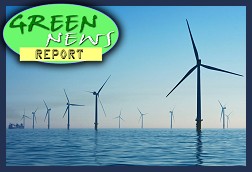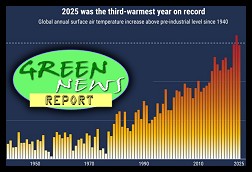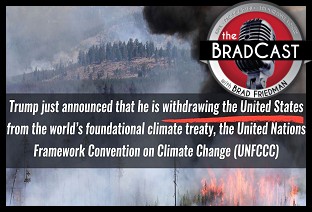
IN TODAY'S RADIO REPORT: Eruption of Bali's volcano could temporarily lower global temperatures; New study finds drilling wakes up sleeping earthquake faults in Texas; U.N. global treaty to curb HFCs comes into force; Tech company files patent on battery-charging breakthrough; PLUS: Elon Musk makes good on his battery bet for South Australia... All that and more in today's Green News Report!
Got comments, tips, love letters, hate mail? Drop us a line at GreenNews@BradBlog.com or right here at the comments link below. All GNRs are always archived at GreenNews.BradBlog.com.
IN 'GREEN NEWS EXTRA' (see links below): Delhi smog crisis worsens; Mexico creates massive ocean reserve; Environmental groups sue to stop AZ Rosemont Mine; Wind energy surpasses coal in Texas; Everglades oil well application rejected; Solar stakes are high as Puerto Rico rebuilds; New Interior plan maximizes fossil fuel extraction on public lands; NC's Outer Banks battles rising seas; Coral reef transplant experiment gives scientists hope for Great Barrier Reef... PLUS: In order to save glyphosate, the Monsanto corporation has undertaken an effort to destroy the United Nations' cancer agency by any means possible... and much, MUCH more! ...
STORIES DISCUSSED ON TODAY'S 'GREEN NEWS REPORT'...
- Bali volcano eruption could lower global temperatures, temporarily:
- Analysis: How could the Agung volcano in Bali affect global temperatures? (Carbon Brief):
Carbon Brief examines how volcanoes influence the climate, and suggests that a new Agung eruption would likely only result in a modest and temporary cooling of global temperatures. - What Bali’s Volcanic Eruptions Could Mean for the Climate (Earther):
Volcanoes are not a get-out-of-jail-free card...If the volcano does become more active, it could do more than cancel flights and incinerate rainforests. It could give the world a brief reprieve from the planetary heat wave of global warming...[T]iny particles of sulphur dioxide in the plume can also linger in the stratosphere. There, they reflect sunlight back into space and cool the climate for a few years before falling back to Earth. - Tens of thousands stranded as Bali volcano closes airport (AP)
- Bali volcano: Mt Agung ash shuts airport for second day (BBC)
- NOAA, NASA: 2017 on track to be in top three hottest years on record globally:
- 2017 Likely to Be Earth's Second Warmest Year on Record, NASA Says (Weather Channel):
The year 2017 remains on track to be the second or third warmest on record, according to three analyses...October 2017 was the second warmest October in records dating to 1880, according to data released Thursday by NASA's Goddard Institute for Space Studies. - October 2017 Was the Second Warmest October on Record (NASA)
- 2017 to be the hottest year on record that wasn’t affected by El Nino: The last three years have been the hottest ever to be recorded (Independent UK)
- Texas earthquakes: drilling awakens dormant faults:
- Discriminating between natural versus induced seismicity from long-term deformation history of intraplate faults, Science Advances (2017). DOI:10.1126/sciadv.1701593 (Science Advances)
- Drilling Reawakens Sleeping Faults in Texas, Leads to Earthquakes (Scientific American):
For 300 million years faults showed no activity, and then wastewater injections from oil and gas wells came along. - New study takes a different approach to showing human activity causing earthquakes in Texas (Phys.Org):
A team of researchers...has taken a new approach to studying the increase of earthquakes in Texas...[T]he group suggests their findings indicate that the wastewater injection process is the only possible cause of a recent uptick in earthquakes around the Fort Worth area. - U.N. treaty on HFCs comes into force:
- Treaty to Phase Out ‘Greenhouse Gases on Steroids’ to Enter Force (NY Times):
The United States is one of the world’s biggest makers of HFCs, and if it fails to ratify the agreement, it could potentially hinder the ability of American companies to sell coolants to other countries that have ratified the agreement. - This Is One International Climate Agreement Trump Supports (Inside Climate News)
- Trump administration backs Obama-led climate effort (Axios)
- Treaty to Phase Out 'Greenhouse Gases on Steroids' to Enter Force (NY Times)
- COP23: Key outcomes agreed at the UN climate talks in Bonn (Carbon Brief)
- What Happened (and Didn't) at the Bonn Climate Talks (NY times)
- Transportation overtakes electricity generation as largest source of US emissions:
- Transportation is the Biggest Source of U.S. Emissions (Climate Central):
The change comes as U.S. electricity generation relies less on coal and more on renewables and natural gas (a less carbon-intensive fossil fuel). Transportation emissions have also declined from a peak in 2008 due to steadily improving fuel economies, although there has been a small uptick recently as a result of a drop in gas prices. The projected growth in electric vehicles suggests decreases in CO2 transportation emissions are on the horizon. Even when accounting for how electricity is generated, an electric vehicle emits less carbon dioxide than a comparable gasoline car in a majority of U.S. states. - Transportation is now the biggest source of US CO2 emissions (Treehugger):
And then you find out that the car manufacturers are working hard to roll back CAFE rules so that they can sell more big SUVs and pickups. According to Influence Map, a site that studies lobbying... - Electric cars are greener than gas, literally everywhere (Treehugger)
- Fisker files patent on battery breakthrough technology:
- Fisker files patents on solid-state battery technology; anticipating automotive-ready from 2023 (Green Car Congress)
- Would you buy a 500-mile range electric car that charges in one minute? (Climate Progress):
Modern EVs (electric vehicles) have key advantages over traditional vehicles, like faster acceleration, lower maintenance costs, and no tail-pipe emissions. And they are the only alternative fuel car with a much lower per-mile fueling cost than petrol cars — ?even when running on carbon-free fuel. - Tesla battery farm for South Australia completed ahead of schedule:
- Tesla Fulfilled Its 100-Day Australia Battery Bet. What’s That Mean for the Industry? (Green Tech Media):
It's the biggest lithium-ion system so far, but has a limited duration: only 129 megawatt-hours to its 100 megawatts of power capacity. Tesla has noted the system holds enough energy to power more than 30,000 homes, roughly the number that lost power during the blackout. But it could only power them for about an hour. That could be long enough to keep customers powered until traditional backup generation sources come on-line, preventing a repeat of the rolling blackouts that spurred the project. - Elon Musk wins bet, finishing massive battery installation in 100 days (Ars Technica):
The Hornsdale Wind Farm near Jamestown, South Australia, produces 315 megawatts of electricity, but, like any wind farm, it's not a steady source of power. So Tesla's batteries will charge up during periods when the wind farm is producing excess energy, then supply extra power to the grid during periods of peak demand. - Tesla's South Australian battery is about to go live. Will it end the blackouts? (Australian Financial Review):
Neither state nor federal governments have taken the steps necessary to reinforce the power grid as it shifts from always-on coal-fired power stations to the variable output of the rapidly proliferating wind turbines and solar panels...On its own, it's not going to solve South Australia's power woes, nor prevent a statewide blackout if another storm takes down transmission towers and powerlines... In an electricity system that is shifting from a centralised, coal-power-based grid to a decentralised grid that includes solar panels, batteries, wind farms and hydro, no single component can be expected to do everything – a point that Weatherill needs to keep reminding anyone who'll listen.
'GREEN NEWS EXTRA' (Stuff we didn't have time for in today's audio report)...
For a comprehensive roundup of daily environmental news you can trust, see the Society of Environmental Journalists' Daily Headlines page
- Diplomats flee Delhi amid worsening smog crisis (Climate Progress)
- Mexico Just Created a Marine Reserve the Size of Michigan (Earther)
- Environmentalists sue Forest Service to overturn Rosemont Mine approval (Arizona Star)
- Wind Power Capacity Moves Past Coal in Texas (AP)
- U.S. oil falls on Keystone restart, doubts about Russia's resolve (Reuters)
- Everglades oil well application rejected (Sun-Sentinel)
- Venezuela's military is reportedly taking over the country's state oil giant (CNBC)
- Stakes Are High for Solar Power as Puerto Rico Rebuilds (WNYC)
- Michigan, Enbridge Reach Deal To Boost Safety Of Pipelines (AP)
- Glyphosate, Top-Selling Weed Killer, Wins E.U. Approval for 5 Years (NY Times)
- New DOI 4-Year Strategic Plan Maximizes Fossil Extraction From Public Lands (NPR)
- Outer Banks Officials and Property Owners Battle to Keep Ocean at Bay (Inside Climate News)
- Coral Transplant Success Gives Scientists Hope For Great Barrier Reef (AFP)
- The Monsanto Papers, Part 1 — Operation: Intoxication: In order to save glyphosate, the Monsanto corporation has undertaken an effort to destroy the United Nations' cancer agency by any means possible. (Environmental Health News)
- Here's a road map for solving 3 of the world's biggest problems (Vox)
- Conservatives probably can't be persuaded on climate change. So now what? (Vox)
- The Climate Risks We Face (NY Times):
To stabilize global temperature, net carbon dioxide emissions must be reduced to zero. The window of time is rapidly closing to reduce emissions and limit warming to no more than 3.6 degrees Fahrenheit or 2 degrees Celsius above preindustrial levels, the goal set in the Paris climate accord. The further we push the climate system beyond historical conditions, the greater the risks of potentially unforeseen and even catastrophic changes to the climate - so every reduction in emissions helps. - The Uninhabitable Earth: When will climate change make earth too hot for humans? (New York Magazine):
Famine, economic collapse, a sun that cooks us: What climate change could wreak - sooner than you think. - A beginner's guide to the debate over 100% renewable energy (Vox):
Clean-energy enthusiasts frequently claim that we can go bigger, that it's possible for the whole world to run on renewables - we merely lack the "political will." So, is it true? Do we know how get to an all-renewables system? Not yet. Not really. - No country on Earth is taking the 2 degree climate target seriously (Vox):
If we mean what we say, no more new fossil fuels, anywhere.
FOR MORE on Climate Science and Climate Change, go to our Green News Report: Essential Background Page


 Trump Admin's Endless Waste, Fraud, Abuse on Voting, at DOJ, by DOGE: 'BradCast' 1/20/26
Trump Admin's Endless Waste, Fraud, Abuse on Voting, at DOJ, by DOGE: 'BradCast' 1/20/26 'Green News Report' 1/20/26
'Green News Report' 1/20/26
 Sunday 'Domestic Terrorist' Toons
Sunday 'Domestic Terrorist' Toons 'A Cornered Rat is a Dangerous Rat': Trump Terrorizes Minn., Menaces NATO, World: 'BradCast' 1/15/26
'A Cornered Rat is a Dangerous Rat': Trump Terrorizes Minn., Menaces NATO, World: 'BradCast' 1/15/26 'Green News Report' 1/15/26
'Green News Report' 1/15/26 'This Isn't Close to Over': Mad King Trump in Venezuela (and Beyond): 'BradCast' 1/14
'This Isn't Close to Over': Mad King Trump in Venezuela (and Beyond): 'BradCast' 1/14 Things Getting Weirder as Trump Keeps Losing: 'BradCast' 1/13/26
Things Getting Weirder as Trump Keeps Losing: 'BradCast' 1/13/26 'Green News Report' 1/13/26
'Green News Report' 1/13/26 After ICE Murder in MN, Local Cops Disown Fed Policing Practices: 'BradCast' 1/12/26
After ICE Murder in MN, Local Cops Disown Fed Policing Practices: 'BradCast' 1/12/26 Sunday 'Ice Age' Toons
Sunday 'Ice Age' Toons 'Green News Report' 1/8/26
'Green News Report' 1/8/26 Trump to Congress, Climate, U.N., Rule of Law: DROP DEAD - 'BradCast' 1/8/26
Trump to Congress, Climate, U.N., Rule of Law: DROP DEAD - 'BradCast' 1/8/26 'Nonsense': Trumpers Claim 315k Fraudulent GA Votes in 2020: 'BradCast' 1/7/26
'Nonsense': Trumpers Claim 315k Fraudulent GA Votes in 2020: 'BradCast' 1/7/26 Jack Smith Testimony on Trump J6 Crimes, DOJ Weaponization: 'BradCast' 1/6/26
Jack Smith Testimony on Trump J6 Crimes, DOJ Weaponization: 'BradCast' 1/6/26 Trump War on Venez. is About Ego, Power, 'Alien Enemies Act': 'BradCast' 1/5/26
Trump War on Venez. is About Ego, Power, 'Alien Enemies Act': 'BradCast' 1/5/26 Have a Holly Jolly Somehow
Have a Holly Jolly Somehow Old Man Shouts at People from WH for 20 Minutes: 'BradCast' 12/18/25
Old Man Shouts at People from WH for 20 Minutes: 'BradCast' 12/18/25 SCOTUS' How-To on Gerrymandering on 'Eve' of Election Year: BradCast' 12/17/25
SCOTUS' How-To on Gerrymandering on 'Eve' of Election Year: BradCast' 12/17/25 Bricks in the Wall: 'BradCast' 12/16/25
Bricks in the Wall: 'BradCast' 12/16/25
 VA GOP VOTER REG FRAUDSTER OFF HOOK
VA GOP VOTER REG FRAUDSTER OFF HOOK Criminal GOP Voter Registration Fraud Probe Expanding in VA
Criminal GOP Voter Registration Fraud Probe Expanding in VA DOJ PROBE SOUGHT AFTER VA ARREST
DOJ PROBE SOUGHT AFTER VA ARREST Arrest in VA: GOP Voter Reg Scandal Widens
Arrest in VA: GOP Voter Reg Scandal Widens ALL TOGETHER: ROVE, SPROUL, KOCHS, RNC
ALL TOGETHER: ROVE, SPROUL, KOCHS, RNC LATimes: RNC's 'Fired' Sproul Working for Repubs in 'as Many as 30 States'
LATimes: RNC's 'Fired' Sproul Working for Repubs in 'as Many as 30 States' 'Fired' Sproul Group 'Cloned', Still Working for Republicans in At Least 10 States
'Fired' Sproul Group 'Cloned', Still Working for Republicans in At Least 10 States FINALLY: FOX ON GOP REG FRAUD SCANDAL
FINALLY: FOX ON GOP REG FRAUD SCANDAL COLORADO FOLLOWS FLORIDA WITH GOP CRIMINAL INVESTIGATION
COLORADO FOLLOWS FLORIDA WITH GOP CRIMINAL INVESTIGATION CRIMINAL PROBE LAUNCHED INTO GOP VOTER REGISTRATION FRAUD SCANDAL IN FL
CRIMINAL PROBE LAUNCHED INTO GOP VOTER REGISTRATION FRAUD SCANDAL IN FL Brad Breaks PA Photo ID & GOP Registration Fraud Scandal News on Hartmann TV
Brad Breaks PA Photo ID & GOP Registration Fraud Scandal News on Hartmann TV  CAUGHT ON TAPE: COORDINATED NATIONWIDE GOP VOTER REG SCAM
CAUGHT ON TAPE: COORDINATED NATIONWIDE GOP VOTER REG SCAM CRIMINAL ELECTION FRAUD COMPLAINT FILED AGAINST GOP 'FRAUD' FIRM
CRIMINAL ELECTION FRAUD COMPLAINT FILED AGAINST GOP 'FRAUD' FIRM RICK SCOTT GETS ROLLED IN GOP REGISTRATION FRAUD SCANDAL
RICK SCOTT GETS ROLLED IN GOP REGISTRATION FRAUD SCANDAL VIDEO: Brad Breaks GOP Reg Fraud Scandal on Hartmann TV
VIDEO: Brad Breaks GOP Reg Fraud Scandal on Hartmann TV RNC FIRES NATIONAL VOTER REGISTRATION FIRM FOR FRAUD
RNC FIRES NATIONAL VOTER REGISTRATION FIRM FOR FRAUD EXCLUSIVE: Intvw w/ FL Official Who First Discovered GOP Reg Fraud
EXCLUSIVE: Intvw w/ FL Official Who First Discovered GOP Reg Fraud GOP REGISTRATION FRAUD FOUND IN FL
GOP REGISTRATION FRAUD FOUND IN FL








































